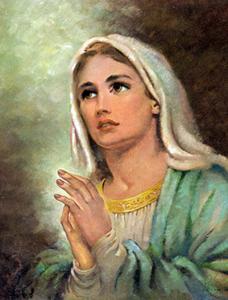‘Almah in Isaiah 7:14 – does this word mean “virgin” or merely “young woman”? In my previous Biblical Words and World post on the Christian teaching that Jesus was virgin-born, I promised that I would dive deeper into the meaning of this key word in the text. Let’s investigate. I think I can give you evidence far more extensive than the doubters will give you that this word really means “virgin.”

“The virgin shall conceive.” That’s how the Greek Old Testament renders the verse in question. It uses the word parthenos (the standard word for “virgin”) to translate the Hebrew term ‘almah. The Jewish translators made this choice in their Greek version, almost 300 years before Matthew seizes upon this line as a prophecy of the miraculous conception of Jesus.
After Matthew’s use of the Septuagint to prove that the Messiah was prophesied to be virgin-born, Jews begin to backtrack from the rendering quoted by Matthew, from Aquila, Symmachus, and Theodotion (in their revised Greek translations), to Justin Martyr’s fictional debate partner Trypho the Jew. Instead, they opt for the word neanis in their translations. And as time moves on to the so-called Enlightenment, we begin to hear that if Isaiah had meant “virgin,” he would have used the word betulah, which is unambiguous.
But wait a minute. First, betulah is no more unambiguous than ‘almah. The Canaanite goddess Anath goes by the title “Virgin” (btlt), but her virginity is questionable (to the extent that one can question the factual details of a myth). Likewise, the virginity of Babylon (Isaiah 47:1) and even Israel are open to question, if collective identities can lose their virginity. True, betulah is most often accompanied by the specification that the girl has never had sexual experience, but one might ask whether that is necessary to spell out, if sexual inexperience is undoubtedly implied in the word. We also have strong reason to question the virginity of the betulah in Joel 1:8, where we read, “Lament like a virgin clothed in sackcloth for the husband of her youth.”
Curiously, even the Greek parthenos is not as unambiguous as often thought. Dinah is still called a parthenos after she is violated by Shechem in Genesis 34:3 (translating the Hebrew na‘arah, “girl”).
Second, we can dismiss the claim that the Hebrew term ‘almah in Isaiah 7:14 can only mean “young woman.” The word, in both its masculine and feminine forms, emphasizes the subject’s youth and inexperience, such as when young David is called an ‘elem in 1 Samuel 17:56 (see also 1 Samuel 20:22, where ‘elem is used to describe what 20:25 calls a na‘ar qaton or “little boy”). Miriam is called an ‘almah in Exodus 2:8, and Proverbs 30:19 refers to the seduction of an ‘almah, a verse which seems to imply that the girl has no prior sexual experience.
Where else is ‘almah used? The five additional verses where this word is used in the Hebrew Bible add nothing pro or con to the debate about whether this word means “virgin.” In Psalm 68:25, we have young girls playing tambourines, which is what the ‘alamoth in 1 Chronicles 15:20 and Psalm 46:1 may also be. In Song of Solomon 1:3, the girl sings to her beloved, “Therefore the young girls love you.”
The only verse left that uses ‘almah that has even a ghost of a chance of implying non-virginity is Song of Solomon 6:8, where the man compares his beloved to “60 queens and 80 concubines, and maidens without number.” Here, ‘almah potentially becomes a victim of guilt by association with two other groups of women who are definitely not virgins. But again, what is proved? The ‘alamoth arguably becomes a category for the women for whom the male lead character has not had the leisure for carnal knowledge.
Finally, going back before Moses into the archaic Canaanite dialect of Hebrew known as Ugaritic, we find ‘almah and betulah being used as poetic synonyms in a text cited by Ugaritic language pioneer Dr. Cyrus Gordon in his article “‘Almah in Isaiah 7:14” (https://academic.oup.com/jaar/article-abstract/XXI/2/106/724404). Gordon also gives us an example from Aramaic where betulta’ is used to describe a pregnant woman who is have problems giving birth (Ugaritic Textbook, 377), more proof that the betulah root is not guaranteed to always mean “virgin.”
The ‘almah root is also found in the substantive noun ‘alumim, “youth/youthfulness”, which is found in Isaiah 54:4, Psalm 89:45, Job 20:11, and Job 33:25. Overall, the picture we get from this term ‘almah is a picture of a girl who is young and inexperienced, a synonym of na‘arah, betulah, and parthenos.
So the claim that Isaiah 7:14’s ‘almah has no connotation of virginity is not as slam-dunk as we’ve been led to believe. Rather, ‘almah is part of a semantic field of words that all emphasize youth and inexperience. The real question is how the birth of any child to any mother (virgin or not) 700 years in the future can be a sign to a king in Isaiah’s day.
It appears that the initial sign to Ahaz was a normal birth that took place in the 730’s BCE. As I said in my previous post, the supernatural conception and birth of Jesus of Nazareth 700 years in the future was Isaiah’s prophecy “on steroids.” It is the ultimate example of sensus plenior, a deeper sense put there by God that goes far beyond what the original human author would have grasped.












